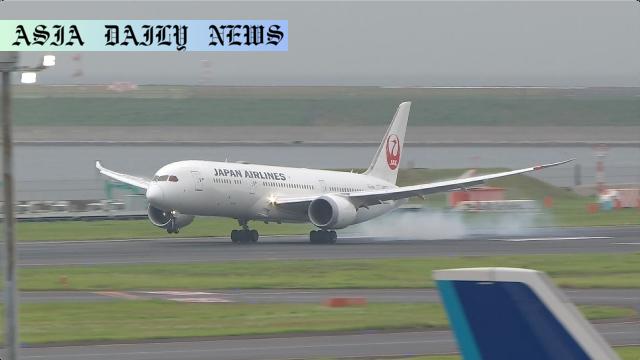Qatar airspace closure leads Doha-bound flight to return amidst safety precautions.

Overview of the Incident
On Monday, Qatar took the extraordinary measure of temporarily closing its airspace over the capital city, Doha. This action followed an Iranian missile attack on a U.S. base located within Qatar. The airspace closure led to significant disruptions in air travel, with many flights en route to or traversing the region having to swiftly alter their plans for safety purposes.
One prominent example of this disruption was Japan Airlines (JAL) Flight 59. The flight, bound for Doha and departing from Tokyo’s Haneda Airport on Monday evening, was forced to return to its origin. The captain made the crucial decision to ensure the safety of all passengers and crew on board after consulting with air traffic authorities. The flight returned safely to Tokyo on Tuesday morning without incident.
Passenger Reactions
The return of the JAL flight impacted a total of 171 passengers. Despite the inconvenience of the unexpected turnback, none reported any dissatisfaction. A 45-year-old businessman en route to Georgia, who had planned a stopover in Doha, expressed his understanding. Though surprised by the timing and abruptness of the event, he acknowledged the importance of prioritizing safety and commended the captain’s decisiveness. Furthermore, the passengers reportedly remained calm, evidencing a composed atmosphere throughout the ordeal.
Geopolitical Context and Consequences
The airspace closure came in response to escalating tension in the Middle East after Iran’s missile strike. This regional instability heightened the focus on security measures, prompting Qatar to act preemptively to avoid risking any danger to flights in and out of its capital. Ripple effects from this decision extended beyond Qatar, as illustrated by the JAL flight’s experience. The incident underscores the challenges airlines face in navigating volatile geopolitical climates while maintaining flight safety standards.
Ensuring Passenger and Crew Safety
Japan Airlines’ quick response highlights the importance of prioritizing safety in unpredictable situations. The decision to return rather than attempt alternative routes or risk entering restricted airspace reflects the airline’s adherence to strict safety protocols. The coordination between the air traffic control and the airline demonstrates how critical communication becomes during crises. The captain’s transparency in communicating the situation to the passengers ensured trust and prevented confusion, which could have exacerbated discomfort during the unexpected turnback.
Broader Impact on the Aviation Industry
The situation throws light on the vulnerability of global aviation to regional conflicts and geopolitical tensions. Airspace closures, whether temporary or prolonged, disrupt flight schedules at a significant scale. This creates challenges for airlines, passengers, and the economies intertwined with aviation. Authorities and airlines must remain vigilant and prepared to adapt operation plans at a moment’s notice to ensure the safety of all stakeholders involved. This particular case serves as a reminder for passengers, airlines, and governments to prioritize contingency planning.
Conclusion
The temporary airspace closure over Doha amid heightened geopolitical tensions was a stark reminder of how external factors can unexpectedly disrupt travel plans. However, thanks to swift and measured action, all involved in JAL Flight 59 reached safety, illustrating the critical role of safety-first protocols in aviation. As global events influence air travel, such as this situation in the Middle East, the aviation industry’s flexibility and emphasis on passenger well-being will always remain paramount.
Commentary
Reflecting on the Impact of Airspace Closures
The decision by Qatar to temporarily close its airspace over Doha serves as a crucial reminder of the fragility of global aviation systems in the face of geopolitical conflicts. While safety concerns always take precedence, the ripple effects of such closures can be extensive, affecting not only flights scheduled through the region but also connecting travel plans for passengers around the globe. It’s a stark reminder of how interconnected the world truly is—and how reliant we are on stability and predictability in international relations to ensure seamless travel.
Commendation for JAL’s Handling of the Situation
Japan Airlines deserves commendation for its expertise and professionalism in managing this disruptive incident. In the aviation world, responding to unexpected situations is part and parcel of ensuring passenger and crew safety. The captain’s prompt decision to return to Tokyo rather than exploring risky alternatives highlights the airline’s commitment to stringent safety protocols. Equally commendable is the transparency displayed in communicating the decision to passengers, many of whom might have been anxious or confused. When passengers trust in their airline’s ability to make the right call, situations like these can be navigated smoothly.
Lessons for Airlines and Passengers Alike
The Doha airspace closure teaches both airlines and passengers a number of valuable lessons. For airlines, it emphasizes the importance of constant vigilance over geopolitical developments and having contingency strategies in place. For passengers, it serves as a gentle reminder to maintain flexibility and understanding, especially when disruptions arise due to safety concerns. After all, while convenience matters, there is no replacement for safety when navigating unpredictable circumstances.
Importance of Geopolitical Stability
Ultimately, this incident sheds light on the broader implications of geopolitical instability on daily life. Situations such as missile attacks or airspace shutdowns appear as headlines to many but have real, tangible impacts on international travel and commerce. Moving forward, it’s crucial for nations to work collaboratively to minimize conflict and its far-reaching consequences—not just for the sake of political stability, but also for the industries and individuals that are indirectly impacted.


